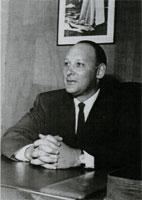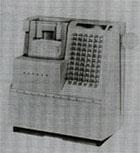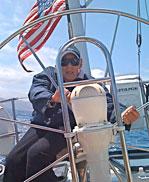Born in New York City to Russian and Lithuanian parents, Stanley A. Dashew can be labeled an inventor, industrialist, entrepreneur, philanthropist, sailor and champion of world peace. His talent for business surfaced during his early years, when he helped manage his family's rental business and, as a teenager, even made a court appearance or two for his father Leon, who was a lawyer. Young Stanley won his case when the other side failed to appear and the judge entered a dismissal by default. At the same time, Stanley exhibited a flair for writing. With his high school pal Melville Shavelson (who was to become President of the Writers' Guild), Stanley published an underground newspaper, "The Wasp -- the Newspaper with the Hidden Sting" After high school, he started selling articles to magazines, but then moved into marketing and sales.Stanley went to work for Addressograph-Multigraph and established a successful sales agency for them. But in 1949, his love of the sea and new opportunities on the west coast led him to outfit a 76-foot schooner, the Constellation, and set sail with his wife, his seven year old son Skip, and his infant daughter Leslie. For one and a half years, they traveled from the Great Lakes down the East Coast, through the West Indies, and across the Panama Canal, finally reaching Los Angeles.
Once settled in L. A., Stanley launched Dashew Business Machines, which produced revolutionary imprinters and embossing systems. They were so revolutionary that the Bank of America partnered with Dashew Business Machines to launch the BankAmericard (now known as Visa), the nation's first bank credit card system.
Another company in which Stanley was a key player, IMODCO, developed a single-point mooring system for offshore oil production. He is credited with the worldwide patents for the "Dashaveyor," a system that moves people and materials, and the "Omnithruster," a bow-thruster that facilitates maneuvering for shipping and military vessels.
Stanley and his wife Rita developed the belief that strengthening international ties and promoting peace among nations begins with cross-cultural understanding among people. This led them to the International Student Center at UCLA, where, starting over fifty years ago, they became active. In 1975, Stanley became President of the Center and assumed the role of Chairman in 1986.
Originally, the International Student Center was not located on the UCLA campus. The Dashews wanted a special venue that fostered a dynamic, welcoming atmosphere for students of disparate nationalities, and so they conceived of the plan to build the Rita and Stanley Dashew Center for International Students and Scholars on the UCLA campus. Our magnificent Center, designed by Mexican architect Ricardo Legoretta, is home to hundreds of programs and gatherings each year.
Since its inception, the Dashew Center has helped engender close relationships among thousands of UCLA students— American and foreign. Students from more than 110 countries have benefited from its services and have gone home to become political, business, educational and artistic leaders in their respective nations.
In recognition of Stanley's dedication to UCLA, in November 2000, he received the UCLA Medal, the university's highest honor, at a ceremony in the Tom Bradley International Hall.
"Your vision for the future of internationalism, and your role as a mentor, philanthropist and friend, give you a special place in the UCLA family," said Chancellor Albert Carnesale as he presented the medal. "You are a leader in enriching the UCLA experience for students from every corner of the globe. As an ardent advocate for educational opportunities to enhance the lives of all students, you have given this important cause a clear and eloquent voice. Our campus community will benefit from your forward-thinking beliefs and tireless service for generations to come."
Transcending the challenges of Parkinson’s disease and two broken hips, Stanley continued to be actively engaged in the Center. Always the entrepreneur, when challenged with mobility issues after suffering from spinal compression and a broken hip, Stanley invented the Dashaway, a mobility device that he credits with saving his life.
Stanley’s autobiography, You Can Do it, was published at the end of 2010.
"A true visionary, Stanley Dashew's legacy and contribution to UCLA have greater meaning today than ever before, particularly as our campus and our community become more decidedly global," said UCLA Vice Chancellor for Student Affairs Janina Montero. Mr. Dashew passed away in 2013 at 96 years old.


